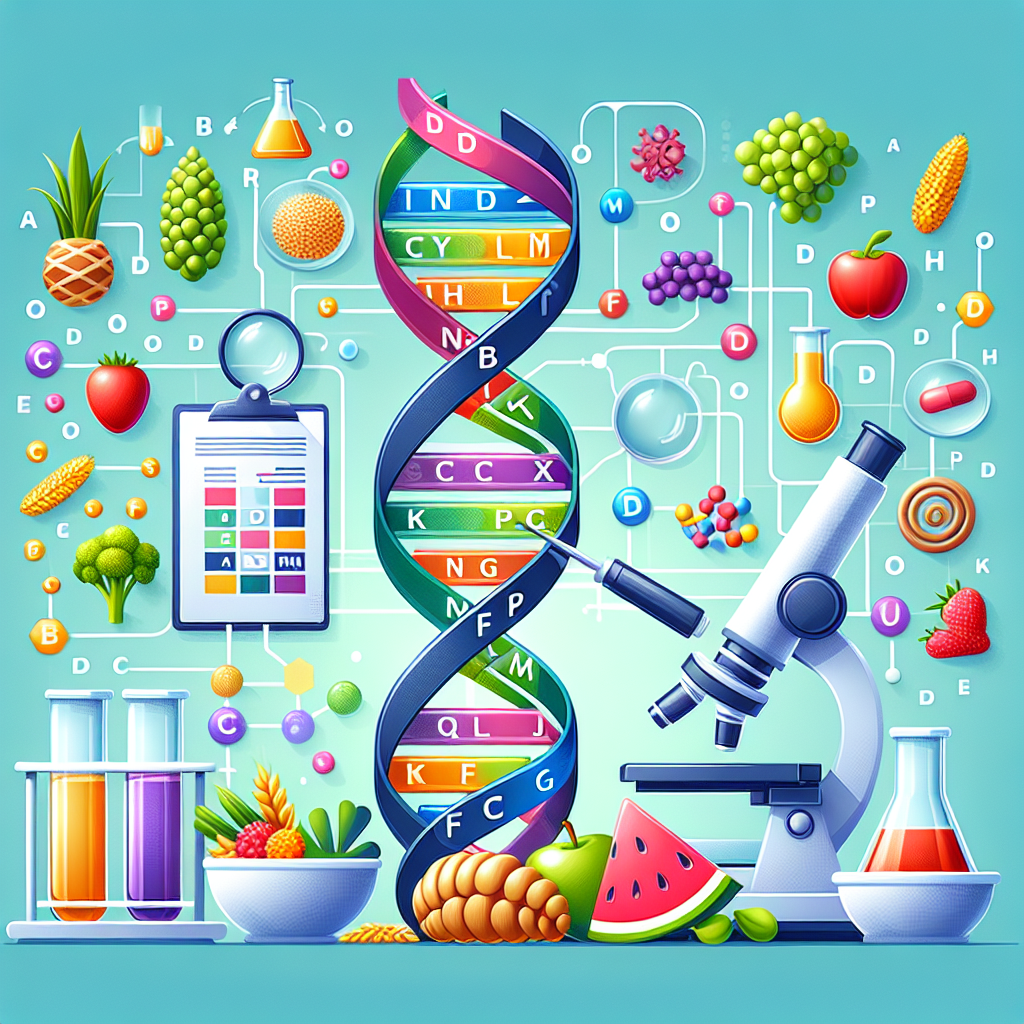Personalized Nutrition and Genetic Testing

Discover the power of personalized nutrition and genetic testing today. Uncover your unique nutritional needs and optimize your health like never before. Start your journey here.
Exploring the Connection Between Personalized Nutrition and Genetic Testing
Personalized nutrition and genetic testing are two rapidly evolving fields that are beginning to intersect in fascinating ways. This intersection is creating a new frontier in health and wellness, where diet and lifestyle recommendations can be tailored to an individual’s unique genetic makeup. This approach, known as nutrigenomics, is revolutionizing the way we think about food, health, and disease prevention.
The concept of personalized nutrition is not entirely new. For years, dietitians and nutritionists have been customizing dietary recommendations based on a variety of factors such as age, gender, weight, and health status. However, the advent of genetic testing has added a new layer of complexity and precision to this process. By analyzing an individual’s DNA, scientists can identify specific genetic variations that may influence how the body metabolizes certain nutrients.
For instance, some people may have a genetic predisposition to absorb more dietary fat than others, putting them at a higher risk for obesity and related health conditions. Others may have genetic variations that affect their ability to metabolize certain vitamins, necessitating higher dietary intake or supplementation. By identifying these genetic variations, personalized nutrition plans can be developed to help individuals optimize their health and potentially prevent disease.
Genetic testing for personalized nutrition typically involves a simple saliva test that can be done at home. The sample is then sent to a lab, where it is analyzed for specific genetic markers related to nutrition and metabolism. The results of this test, combined with other information such as lifestyle factors and health history, are used to create a personalized nutrition plan.
This approach to nutrition is not without its critics. Some argue that the science of nutrigenomics is still in its infancy and that more research is needed to fully understand the complex interactions between genes, diet, and health. Others worry about the potential for genetic information to be misused or misunderstood.
However, proponents of personalized nutrition and genetic testing argue that this approach has the potential to revolutionize health and wellness. By tailoring dietary recommendations to an individual’s unique genetic makeup, they argue, we can move away from a one-size-fits-all approach to nutrition and towards a more personalized, effective strategy for health and disease prevention.
Moreover, personalized nutrition and genetic testing can empower individuals to take control of their health. By understanding their genetic predispositions, individuals can make informed decisions about their diet and lifestyle that can help them optimize their health and potentially prevent disease.
In conclusion, the intersection of personalized nutrition and genetic testing is an exciting new frontier in health and wellness. While more research is needed to fully understand the complex interactions between genes, diet, and health, the potential benefits of this approach are clear. By tailoring dietary recommendations to an individual’s unique genetic makeup, we can move towards a more personalized, effective strategy for health and disease prevention. As the science of nutrigenomics continues to evolve, it will undoubtedly continue to shape our understanding of nutrition and health in profound and exciting ways.
The Role of Genetic Testing in Personalized Nutrition Plans

Personalized nutrition is a rapidly evolving field that leverages the power of genetic testing to create individualized dietary plans. This approach is based on the understanding that our genes play a significant role in determining how our bodies respond to different foods and nutrients. By examining an individual’s genetic makeup, it is possible to provide tailored nutritional advice that can help prevent disease, optimize health, and enhance athletic performance.
Genetic testing is the cornerstone of personalized nutrition. It involves analyzing an individual’s DNA to identify specific genetic variants that can influence nutritional needs. These variants, known as single nucleotide polymorphisms (SNPs), can affect how the body metabolizes certain nutrients, how it responds to dietary interventions, and its susceptibility to nutrition-related diseases.
For instance, some people have a genetic variant that impairs their ability to metabolize folate, a nutrient that is crucial for DNA synthesis and repair. These individuals may benefit from consuming more folate-rich foods or taking a folate supplement to prevent deficiencies. Similarly, some people have a genetic predisposition to high cholesterol levels. For these individuals, a diet low in saturated fats and cholesterol may be particularly beneficial.
Genetic testing can also provide insights into how an individual’s body responds to different types of diets. For example, some people may have a genetic makeup that makes them more likely to lose weight on a low-fat diet, while others may respond better to a low-carbohydrate diet. This information can be invaluable in creating a personalized nutrition plan that is not only effective but also sustainable in the long term.
Moreover, genetic testing can help identify an individual’s risk of developing certain nutrition-related diseases, such as type 2 diabetes, heart disease, and certain types of cancer. By understanding these risks, it is possible to implement dietary strategies that can help prevent these diseases. For example, individuals with a high genetic risk of type 2 diabetes may benefit from a diet that is low in refined carbohydrates and sugars.
However, it is important to note that while genetic testing can provide valuable insights, it is not the only factor to consider when creating a personalized nutrition plan. Other factors, such as lifestyle, physical activity levels, medical history, and personal preferences, also play a crucial role. Therefore, genetic testing should be seen as a tool to complement, not replace, traditional dietary advice.
Furthermore, the field of personalized nutrition is still relatively new, and more research is needed to fully understand the complex interactions between our genes, diet, and health. Therefore, it is recommended to seek the advice of a healthcare professional or a registered dietitian before making significant changes to your diet based on genetic testing results.
In conclusion, genetic testing plays a pivotal role in personalized nutrition by providing insights into an individual’s unique genetic makeup and nutritional needs. This information can be used to create tailored dietary plans that can help prevent disease, optimize health, and enhance athletic performance. However, it is important to remember that genetic testing is just one piece of the puzzle, and a holistic approach that considers all aspects of an individual’s health and lifestyle is essential for optimal nutrition.
Understanding the Impact of Genetic Testing on Personalized Nutrition
Personalized nutrition and genetic testing are two rapidly evolving fields that are beginning to intersect in fascinating ways. As we delve deeper into the human genome, we are discovering that our genes can have a significant impact on our nutritional needs. This has led to the development of personalized nutrition plans based on genetic testing, a concept that is revolutionizing the way we approach diet and health.
Genetic testing, in its simplest form, involves analyzing an individual’s DNA to identify specific genetic variants. These variants can influence a wide range of biological processes, including how our bodies metabolize nutrients. For instance, some people may have a genetic predisposition to absorb certain vitamins more efficiently than others. Similarly, certain genetic variants can affect how our bodies respond to different types of dietary fats.
The concept of personalized nutrition takes these genetic differences into account. Instead of following a one-size-fits-all diet, individuals can tailor their nutritional intake based on their unique genetic makeup. This approach has the potential to optimize health and prevent disease in a way that traditional dietary recommendations cannot.
The impact of genetic testing on personalized nutrition is profound. By identifying genetic variants that affect nutrient metabolism, we can provide more precise dietary advice. For example, someone with a genetic variant that impairs vitamin D absorption might benefit from higher dietary intake of this nutrient or from supplementation. Similarly, an individual with a genetic predisposition to high cholesterol might need to be more cautious about their intake of saturated fats.
Moreover, genetic testing can also reveal predispositions to certain health conditions that can be managed, at least in part, through diet. For instance, individuals with a genetic risk for type 2 diabetes might benefit from a diet that is low in refined carbohydrates. Those with a genetic predisposition to osteoporosis might need to ensure they are getting enough calcium and vitamin D.
However, it’s important to note that while genetic testing can provide valuable insights, it’s not the only factor to consider when developing a personalized nutrition plan. Lifestyle factors, such as physical activity levels, stress, sleep, and environmental exposures, also play a crucial role in our nutritional needs. Furthermore, our gut microbiome, the community of microorganisms living in our digestive tract, can also influence how we metabolize nutrients.
In addition, while the science of personalized nutrition is promising, it’s still in its early stages. Not all genetic variants that affect nutrient metabolism have been identified, and the interactions between genes, diet, and health are complex. Therefore, while genetic testing can provide a useful tool for personalized nutrition, it should be used in conjunction with other assessments and under the guidance of a healthcare professional.
In conclusion, the intersection of personalized nutrition and genetic testing represents an exciting frontier in the field of nutrition science. By tailoring dietary recommendations to an individual’s unique genetic makeup, we have the potential to optimize health and prevent disease in a way that was not previously possible. However, it’s important to remember that genetics is just one piece of the puzzle, and a holistic approach that considers all aspects of an individual’s lifestyle is essential for optimal health.